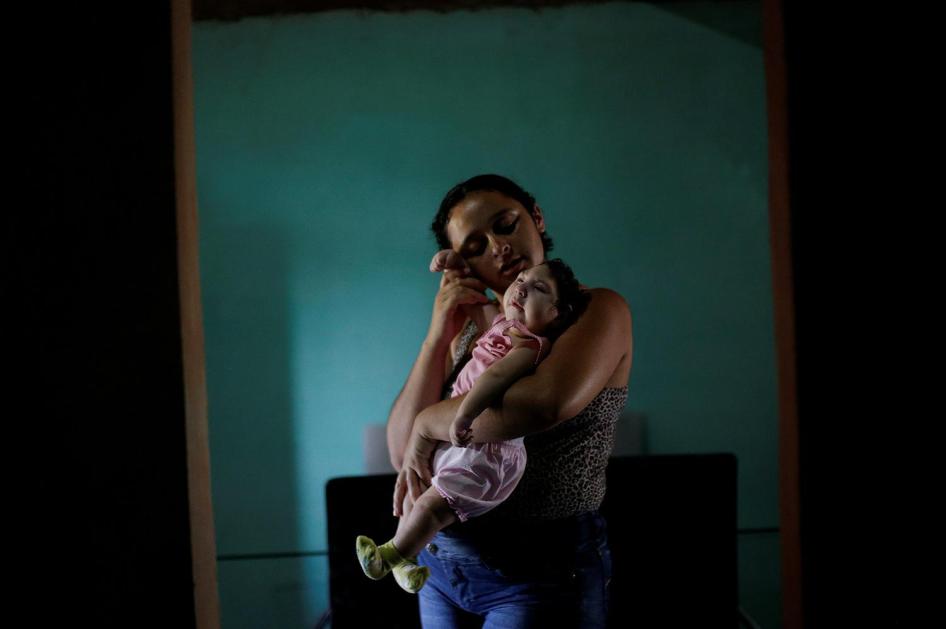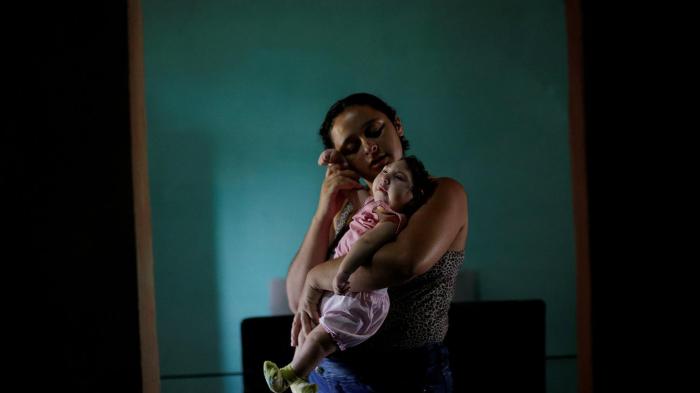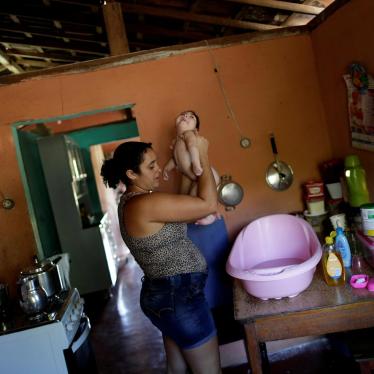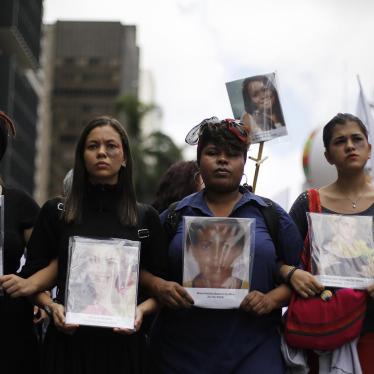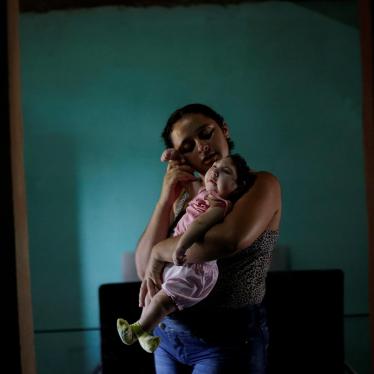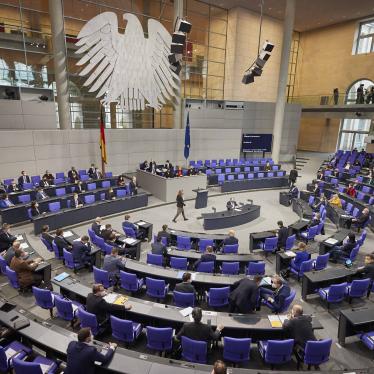(São Paulo) – Brazil has not addressed longstanding human rights problems that allowed the Zika outbreak to escalate, leaving the population vulnerable to future outbreaks and other serious public health risks, Human Rights Watch said in a report released today. The government declared an end to the national public health emergency related to the Zika virus in May 2017, but the Zika threat in Brazil remains.
The 103-page report, “Neglected and Unprotected: The Impact of the Zika Outbreak on Women and Girls in Northeastern Brazil,” documents gaps in the Brazilian authorities’ response that have a harmful impact on women and girls and leave the general population vulnerable to continued outbreaks of serious mosquito-borne illnesses. The outbreak hit as the country faced its worst economic recession in decades, forcing authorities to make difficult decisions about allocating resources. But even in earlier times of economic growth, government investments in water and sanitation infrastructure were inadequate. Years of neglect contributed to the water and wastewater conditions that allowed the proliferation of the Aedes mosquito and the rapid spread of the virus, Human Rights Watch found.
“Brazilians may see the Health Ministry’s declaration of the end of the Zika emergency as a victory, but significant risks remain as do the underlying rights issues it exposed,” said Amanda Klasing, senior women’s rights researcher at Human Rights Watch and a co-author of the report. “Brazilians’ basic rights are at risk if the government doesn’t reduce mosquito infestation over the long term, secure access to reproductive rights, and support families raising children affected by Zika.”
The announcement came 18 months after the government declared Zika a national emergency, as increasing numbers of infants were born with microcephaly – a condition in which the infant’s head is smaller than expected – and other potential health problems, together now known as Zika syndrome. But Aedes mosquitos are still present in Brazil, and still carry Zika and other serious viruses. A recent outbreak of yellow fever, which can be spread by the same mosquito, has killed at least 240 people in Brazil since December 2016. Climatic phenomena, like the 2015 El Niño, with the backdrop of climate change and steadily rising temperatures, may contribute to the more rapid spread of mosquito-borne illnesses.
Brazilian authorities should make long overdue investments in water and sanitation infrastructure to control mosquito breeding and improve public health, Human Rights Watch said. Authorities should also provide comprehensive reproductive health information and services for women and girls, decriminalize abortion, and ensure children with Zika syndrome have long-term access to services to give them the best possible quality of life.
Human Rights Watch interviewed 183 people in Pernambuco and Paraíba, two of the northeastern states hardest hit by the virus, including 98 women and girls ages 15 to 63. Forty-four of these women were pregnant or had recently given birth, and 30 were raising children with Zika syndrome. Human Rights Watch also spoke to men and boys in affected communities, service providers and other experts, and government authorities, and analyzed government and other data on health surveillance, water and wastewater assets, and budgets.
In response to the Zika outbreak, Brazilian authorities have encouraged household-level efforts such as cleaning water storage containers and eliminating standing water in homes. Women and girls are often the ones responsible for these tasks, but their efforts are burdensome and cannot fill the considerable gap left by inadequate government action. The authorities have failed to make necessary investments in water and sanitation infrastructure for long-term control of mosquito breeding and to improve public health.
More than one-third of Brazil’s population lacks access to a continuous water supply. That leaves people with no choice but to fill tanks and other containers with water for household use, which can unintentionally become potential mosquito breeding grounds if left uncovered and untreated. Poor wastewater infrastructure creates standing water in communities. More than 35 million people in Brazil lack adequate facilities and services for the safe disposal of human waste. Only an estimated 50 percent of the population was connected to a wastewater system in 2015, and less than 43 percent of the country’s total volume of wastewater was treated. In Brazil’s northeast in 2015, less than 25 percent of the population was connected to a wastewater system, and only 32 percent of wastewater was treated.
Human Rights Watch saw untreated sewage flowing into open, uncovered channels, storm drains, roads, or waterways near communities that are often obstructed with debris, creating dirty, standing water – ideal conditions for mosquito breeding.
In the areas studied, some women and girls did not have access to comprehensive reproductive health information and services through the public health system. Many cannot avoid unplanned pregnancies or make informed decisions about their pregnancies.
Criminal penalties for abortion force pregnant women and girls to turn to clandestine, and often unsafe, procedures to terminate unwanted pregnancies. Some doctors said they had treated women and girls in the last year who had turned to caustic acid or other unsafe methods to try to induce abortion. One 23-year-old woman who was raped as an adolescent and had heavy bleeding after a clandestine abortion said, “I didn’t have a lot of information… I bled a lot.”
Unsafe abortion remains the fourth-leading cause of maternal mortality in Brazil. Since 2005, more than 900 women have died from unsafe abortion in Brazil – largely preventable maternal deaths. The risk of Zika infection during pregnancy will likely lead even more women to seek unsafe and clandestine abortions. A July 2016 study published in the New England Journal of Medicine found a 108 percent increase in abortion requests from Brazil received by Women on Web – a nonprofit organization providing abortion medication in countries where safe abortion services are highly restricted – following a November 2015 Pan American Health Organization announcement related to Zika virus risks.
Many pregnant women and girls interviewed said that during their prenatal appointments, public health workers did not provide comprehensive information about preventing Zika transmission. Many said health workers didn’t inform them that Zika could be transmitted sexually, partially due to conflicting or inconsistent information from authorities. As a result, few were consistently using condoms to protect themselves and their fetus from Zika transmission.
Pregnant women from low-income households that typically have the worst water and wastewater systems and high exposure to mosquitos said they did not have the means to purchase mosquito repellent for everyday use.
More than 2,600 children in Brazil born with microcephaly and other conditions from the Zika virus will need long-term support. Their primary caregivers often don’t receive the full support they need from the government and society to raise their children with disabilities, including financial and logistical support to make care accessible. Mothers raising children with Zika syndrome said they found it hard to get information and support both at the time of delivery, and as their children grew and developed. Health providers and parents of children with Zika syndrome said that fathers needed additional support to actively participate in caregiving.
One father told Human Rights Watch he had to spend almost his entire monthly salary on medications for his child with Zika syndrome.
In 2017, the number of Zika cases, and the number of infants born with disabilities linked to the virus, dropped dramatically as compared to the same period in 2016, but authorities cannot identify the cause of the reduction in cases.
“As mosquito season amps up in parts of the Americas and the United States, other Zika-affected countries should recognize that human rights problems can contribute to the rapid escalation and impact of the Zika epidemic,” Klasing said. “Countries hoping to avoid the crisis Brazil continues to face should address human rights issues at the outset of their planning and response.”
